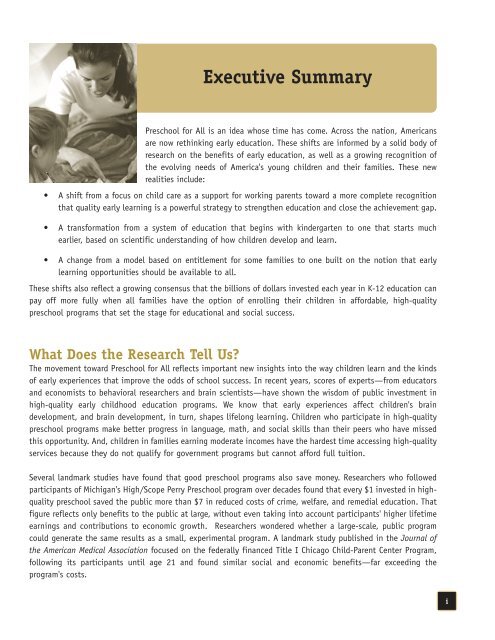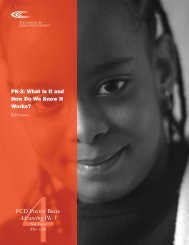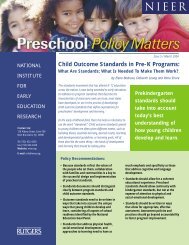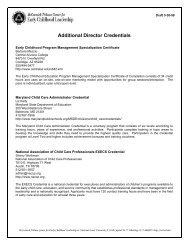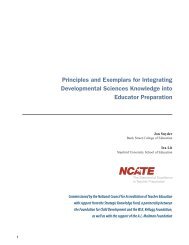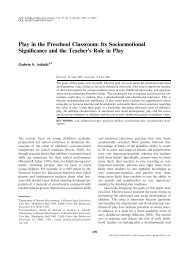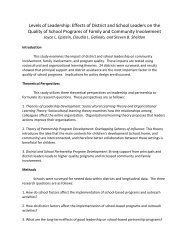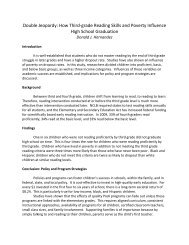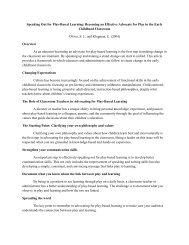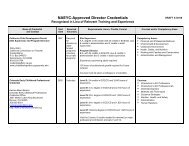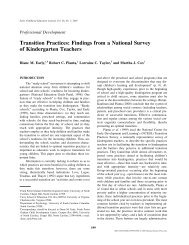High-Quality Early Education For All of Illinois' Children - Ounce of ...
High-Quality Early Education For All of Illinois' Children - Ounce of ...
High-Quality Early Education For All of Illinois' Children - Ounce of ...
- No tags were found...
Create successful ePaper yourself
Turn your PDF publications into a flip-book with our unique Google optimized e-Paper software.
Executive SummaryPreschool for <strong>All</strong> is an idea whose time has come. Across the nation, Americansare now rethinking early education. These shifts are informed by a solid body <strong>of</strong>research on the benefits <strong>of</strong> early education, as well as a growing recognition <strong>of</strong>the evolving needs <strong>of</strong> America's young children and their families. These newrealities include:• A shift from a focus on child care as a support for working parents toward a more complete recognitionthat quality early learning is a powerful strategy to strengthen education and close the achievement gap.• A transformation from a system <strong>of</strong> education that begins with kindergarten to one that starts muchearlier, based on scientific understanding <strong>of</strong> how children develop and learn.• A change from a model based on entitlement for some families to one built on the notion that earlylearning opportunities should be available to all.These shifts also reflect a growing consensus that the billions <strong>of</strong> dollars invested each year in K-12 education canpay <strong>of</strong>f more fully when all families have the option <strong>of</strong> enrolling their children in affordable, high-qualitypreschool programs that set the stage for educational and social success.What Does the Research Tell Us?The movement toward Preschool for <strong>All</strong> reflects important new insights into the way children learn and the kinds<strong>of</strong> early experiences that improve the odds <strong>of</strong> school success. In recent years, scores <strong>of</strong> experts—from educatorsand economists to behavioral researchers and brain scientists—have shown the wisdom <strong>of</strong> public investment inhigh-quality early childhood education programs. We know that early experiences affect children's braindevelopment, and brain development, in turn, shapes lifelong learning. <strong>Children</strong> who participate in high-qualitypreschool programs make better progress in language, math, and social skills than their peers who have missedthis opportunity. And, children in families earning moderate incomes have the hardest time accessing high-qualityservices because they do not qualify for government programs but cannot afford full tuition.Several landmark studies have found that good preschool programs also save money. Researchers who followedparticipants <strong>of</strong> Michigan's <strong>High</strong>/Scope Perry Preschool program over decades found that every $1 invested in highqualitypreschool saved the public more than $7 in reduced costs <strong>of</strong> crime, welfare, and remedial education. Thatfigure reflects only benefits to the public at large, without even taking into account participants' higher lifetimeearnings and contributions to economic growth. Researchers wondered whether a large-scale, public programcould generate the same results as a small, experimental program. A landmark study published in the Journal <strong>of</strong>the American Medical Association focused on the federally financed Title I Chicago Child-Parent Center Program,following its participants until age 21 and found similar social and economic benefits—far exceeding theprogram's costs.i


